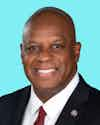The Business of Diversity

Diversity is America’s strength, spurring the innovation and creativity that have made the U.S. economy the most vibrant and dynamic in history. When businesses recognize and embrace different perspectives, they are better able to create value, serve customers, support employees, and solve problems. By providing opportunities for everyone, businesses help lift communities and strengthen the health, prosperity, and competitiveness of our nation and our society.
Become a part of the world’s largest business organization and network
U.S. Chamber members range from small businesses and chambers of commerce across the country to startups in fast-growing sectors, leading industry associations, and global corporations.
Discover the ROI Chamber membership can deliver for you.
Our Work
We believe a diverse workforce is a business imperative. Guided by data and informed by conversations with business, government, academic, and civic leaders, the U.S. Chamber’s Equality of Opportunity Initiative (EOI) advances public and private sector solutions to help close opportunity gaps. Focusing on employment, entrepreneurship, education, and criminal justice, the EOI agenda aims to help all people go as far and as high as their talent and hard work will take them.
Events
- TechnologyTechnology Leadership Summit 2026Wednesday, March 1108:30 AM EDT - 02:00 PM EDTU.S. Chamber of Commerce, 1615 H St NW, Washington, DC 20062Learn More
- InfrastructureKeep America Moving SummitTuesday, March 1708:00 AM EDT - 05:30 PM EDTU.S. Chamber of Commerce, 1615 H St NW, Washington, DC 20062Learn More
Latest Content
- This event was part of the Chamber’s Women Taking the Lead series, an initiative of the U.S. Chamber convening and connecting high-level women leaders in government and business.This guide provides detailed information on second chance hiring tax credits and programs for employers who are willing to give individuals with a criminal record an opportunity.As CEO and co-founder of The Urban Grape, Hadley Douglas is creating opportunities for women to thrive in the wine industry.Hans Edwards, co-owner of Edwards & Hill Furniture, enriches the community through charitable initiatives and mentorship programs.Two Black Chamber executives reflect on the role of Black business in American history and key issues facing the community today.The Slone Group (TSG) helps companies design workplaces with welcoming cultures where team members feel respected, valued, and heard.Lillian Werbin, whose Elderly Instruments won America’s Top Small Business 2023, reflects on the path to success and giving back.Owners TJ and Hadley Douglas were named America's Top Small Business in 2021 and sit on the Chamber's Small Business Council. The expansion builds on their mission to make the wine industry more accessible.The Next-Gen internship program strives to inspire the next generation of business leaders. Meet the distinguished 2023 cohort.The U.S. Chamber's Next-Gen Business Partnership and Urban Alliance hosted a mixer to inspire and equip students with the necessary knowledge and skills to succeed as leaders in both the public and private sectors.












